Not in US interests to cut off relations with Pakistan: Clinton
Says US has no evidence to suggest people at higher level knew about bin Laden. Dr Afridi needs to be released.
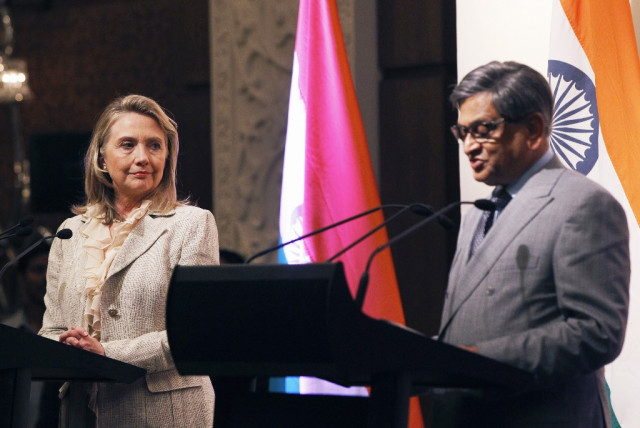
In a joint interview with Charlie Rose on a show by the same name, both US Secretary of State Hillary Clinton and former Secretary of State James Baker underscored that despite differences on some important regional and international issues, severing ties with Pakistan would not be in Washington's interests.
“I think we need to maintain the relationship with them because they are a nuclear power, and because we do not want to see nuclear conflagration in the sub continent and see any more proliferation than we have already seen,” Baker said.
"I think that our relationship with Pakistan has been challenging for a long time. Some of it is of our own making," Clinton admitted on the programme.
The Secretary added “we are living with a country which has a lot of difficult issues both for themselves and then for us and others.”
Suggesting on how to proceed on the difficult relation, the incumbent Secretary of State said that “first of all I completely agree it is not in our interests to cut off our interest, it is in our interest to do better direct and manage that relationship and we are asking Pakistanis to do more of and better.”
“They have got to do more against safe havens inside their own country.” However the problem that prevented progress was that “extremists have an ace in the hole, they just cross the border they get direction, funding and fighters and they go back across the border,” pointing to how militants were able to escape to uncontrolled regions between Pakistan and Afghanistan.
No evidence of Pakistan involvement in bin Laden sanctuary
US Secretary of State Hillary Clinton said on Thursday that so far, the US does not have proof that someone at the top in Pakistan knew about the whereabouts of Osama bin Laden.
"We have never been able to prove that anyone at the upper levels knew that,” the US Secretary of State said.
"When I first went to Pakistan as Secretary in 2009 that I found it impossible to believe that somebody in their government didn't know where he was, and I still believe that. That he took up residence and built this huge compound in a military garrison town," Clinton said.
"But to be fair, we have no evidence."
"I have no reason to believe that the civilian government knew anything,” she said before adding that the answer perhaps lay with lower level military and intelligence officials. “So who was in what level of responsibility in the military or the ISI, whether they were active or retired, because we do know that there are links to retired members, but we've never been able to close that loop," the Secretary of State said.
Stop treating Dr Shakil Afridi as a ‘criminal’
Clinton once again called on Pakistan to immediately release Dr Shakil Afridi, who had helped the CIA to trace Osama bin Laden, and stop treating him like a "criminal".
"They should release Dr (Shakil) Afridi," Clinton said.
"This is something that is so unnecessary and gratuitous on their part."
Clinton said “Pakistanis claimed he was their enemy as well and my argument to them is that this man contributed to ending the al Qaeda leadership that was in their country and they shouldn’t treat him like a criminal."
Pakistan losing sovereignty
Pointing out that the militants were harming the host as well, she said that Pakistan, despite the talk of sovereignty, were losing it. “They are losing sovereignty, large areas that are ungoverned, they have a rash of terrible attacks more than 30,000 people have been killed in the last decades. They talk a lot about sovereignty, well the first job of any sovereign nation is to protect your own people and secure your own border and that is what they should be doing.”
Clinton added that Pakistan needs to recognise that “as the US withdraws from Afghanistan it is in their interest to have a strong stable Afghan government and that can only come from by being part of the solution at that [negotiaiton] table to try to help with Afghanistan’s economic, political and security development rather than doing everything possible to undermine it”.
Using aid to leverage
Former Secretary of State James Baker, who had served in during the tenure George Bush Sr, 1989 to 1992, recounted how in his second year in office, had refused to sign a certification that Pakistan was not building a nuclear weapon. That, Baker reminded, eventually led to US aid to Pakistan being cut off.
“At some point we need to seriously think about doing that. We need to get their attention,” he said suggestively.
When Rose asked whether the US could use a threat to stop aid to leverage the US into getting the Pakistani side to stop double dealing the US, Baker said “I am not sure we give them enough so that’s gonna make them stop them – they should know we are upset about this and that should make them stop.”
Asked by the host whether he was contradicting himself on urging for cancelling aid, Baker said that the US needs to “maintain a relationship with them [Pakistan], but we need to get their attention. We shouldn’t break the relationship right now, sever the relationship totally.”

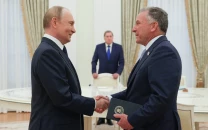
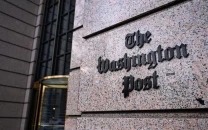
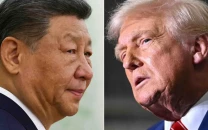

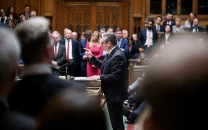
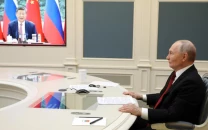












COMMENTS
Comments are moderated and generally will be posted if they are on-topic and not abusive.
For more information, please see our Comments FAQ